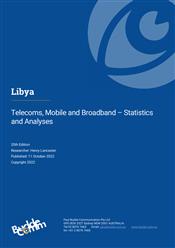Libya Telecoms Market Report
Telecoms, Mobile and Broadband - Statistics and Analyses

Libyan government again promotes telecom sector competition
During the last few years Libya has struggled to rebuild its economy and infrastructure following disruption caused by the civil war and the subsequent political unrest. Much of the telecom infrastructure was destroyed or stolen following the 2011 disturbances, including about a quarter of the country’s mobile tower sites. For many years reconstruction efforts were stymied by political and military disturbances which affected much of the country. During the decade during which there were two opposing administrations, based in Tripoli and Tobruk, there was no consensus as to how to rebuild infrastructure on a national scale despite numerous attempts to reach a political solution. Some change is anticipated following the formation of a UN-brokered Government of National Unity in March 2021, though this was an interim measure pending the anticipated presidential and legislative elections set for late December 2021.
Despite the political deadlock, there has been some progress made in rebuilding telecom infrastructure. The MNOs have cooperated to extend the reach of LTE services in the south of the country. This has been facilitated by the newly achieved political stability, since the various warring factions had previously targeted telecom towers.
The mobile market is supported by some of the lowest tariffs on the continent. Opportunities remain in the broadband sector where market penetration is still relatively low. To stimulate take-up of services, the regulator in mid-2020 imposed a 50% reduction in internet subscription charges. As for mobile broadband, LTE services have only a limited reach and thus the development of this sector has been slow. A limited 5G service was made available in November 2019.
More recently, ARPU in this market has been affected by the January 2021 devaluation of the currency against the US dollar. The devaluation was enforced by the Central Bank of Libya in a bid to meet certain policies of the United Nations aimed at encouraging peace between the two opposing factions, and at strengthening the economy.
Key developments:
- Hatif Libya contracts Infinera to provide an optical transport network to unserved areas of the country;
- Government commits to liberalising the telecom market;
- Silphium submarine cable linking Derna with Greece is again brought on stream;
- LPTIC contracts Ericsson to maintain and develop the country’s telecom networks and infrastructure;
- Government orders 50% reduction in internet subscription fees;
- Al-Madar extends LTE service to Benghazi and Misurata;
- LTT launches LTE-based fixed broadband network;
- LPTIC signs $80 million contract with Arabsat to provide satellite broadband services;
- Italy-Libya cable upgraded to support 100Gb/s technology;
- Report update includes updated Telecom Maturity Index charts and analyses, recent market developments.
Companies mentioned in this report:
Al-Madar, Libyana, LibyaPhone, Libya Post and Telecommunication Information Technology (LPTIC), General Posts and Telecommunications Company (GPTC), Hatif Libya, Libya International Telecom Company (LITC), Libya Telecom & Technology (LTT), Lap Green Networks, Gateway, Thuraya, Phoenicia Group, Hermes Communications, Wiseband, Bentley Walker, Virtual Dimensions, Ericsson, Nokia, Alcatel-Lucent, Huawei, ZTE, Trans-Sahara
Related Reports
- Africa - Mobile Infrastructure and Mobile Broadband
- Africa - Mobile Network Operators and MVNOs
- Africa - Fixed Broadband Market - Statistics and Analyses
- Sudan - Telecoms, Mobile and Broadband - Statistics and Analyses
- Senegal - Telecoms, Mobile and Broadband - Statistics and Analyses
- Liberia - Telecoms, Mobile and Broadband - Statistics and Analyses
- Eswatini (Swaziland) - Telecoms, Mobile and Broadband - Statistics and Analyses
- Democratic Republic of Congo - Telecoms, Mobile and Broadband - Statistics and Analyses
- Djibouti - Telecoms, Mobile and Broadband - Statistics and Analyses
- Tunisia - Telecoms, Mobile and Broadband - Statistics and Analyses
Share this Report
TMT Intelligence
A platform to scale your intelligence tasks
Monitor critical insights with our AI-powered Market Intelligence Platform gathering and analyzing intelligence in real time. With AI trained to spot emerging trends and detect new strategic opportunities, our clients use TMT Intelligence to accelerate their growth.
If you want to know more about it, please see:
Research Methodology
BuddeComm's strategic business reports contain a combination of both primary and secondary research statistics, analyses written by our senior analysts supported by a network of experts, industry contacts and researchers from around the world as well as our own scenario forecasts.
For more details, please see:
More than 4,000 customers from 140 countries utilise BuddeComm Research
Are you interested in BuddeComm's Custom Research Service?
Hot Topics
News & Views
Have the latest telecommunications industry news delivered to your inbox by subscribing to BuddeComm's weekly newsletter.